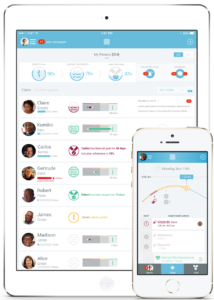August 29, 2017
Coaching Platform Twine Works to Increase Treatment Adherence, Lower Medical Cost

With lack of patient adherence to treatment being a costly problem in the United States, MIT Media Lab spinout Twine Health has gained notice recently as a potential solution. Twine, a health activation platform, aims to improve health and lower medical costs. Recently, the startup has moved the platform into workplace-health spaces to help cut the continuously rising price of healthcare for employers.
Twine began when CEO and co-founder John Moore felt held back by the current medical system. He grew tired of patients with chronic diseases only briefly being seen by doctors once every few months or per year. While visiting the MIT Media Lab, he was blown away by their philosophy on how technology and humans can work together. He then began working with Media Lab Director Frank Moss and another engineer to “bring science to health care delivery,” resulting in the creation of Twine.
Twine works through an app that tracks adherence and progress towards health goals. Users input their goals into the app, which then connects them with a registered medical expert. Patients who use Twine can work independently or with health coaches or other members of their community, such as friends or family, to plan and monitor their progress. The app also analyzes the association between actions and outcomes to help users prioritize and make adjustments if the interventions they have chosen are not working.
Twine currently has 65 workplace clients across the US and nearly 100,000 employee users. In May, the company began working with Activate Healthcare. A month later in June, Twine also partnered with Wellness Coaches, which operates on-site health coaching for more than 500 employer worksites in 35 states. Twine sees about 85% of enrolled employees active in the platform monthly, and of those enrolled, 90% reach their targets in 90 days.
The company also boasts success from a case study done at the Joslin Diabetes Center in Boston which showed a 3.2% absolute drop in hemoglobin A1c over three months in patients who used Twine combined with standard care. This is compared to patients receiving just standard care who typically only see a 1% drop in the course of a year. Case studies for diabetes and hypertension management at Massachusetts General Hospital, the Boston Medical Center, the Carolinas HealthCare System, and Penn Medicine have shown similarly positive results.
Twine hopes to continue its impact, potentially magnifying it by tenfold, which could be “transformative” for healthcare.
Written by: Michael La Penna
Filed Under: General, Latest News, Vendor Updates
Trackback URL: https://onsiteclinics.org/2017/08/29/coaching-platform-twine-works-to-increase-treatment-adherence-lower-medical-cost/trackback/

